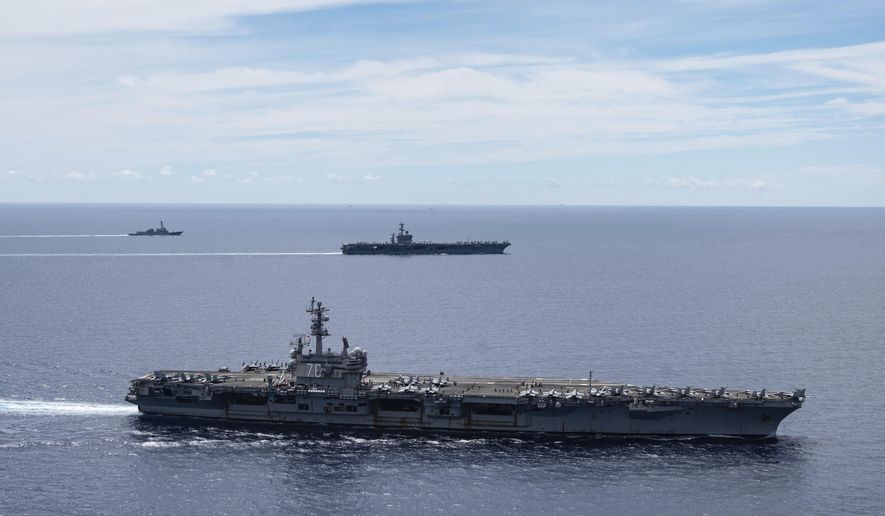The Pentagon has ordered the USS Ronald Reagan Carrier Strike Group to “remain on station” to monitor China’s ongoing military maneuvers in response to House Speaker Nancy Pelosi’s visit to Taiwan, the White House announced Thursday.
The strike group will conduct air and maritime transits through the Taiwan Strait “in the next few weeks,” National Security Council spokesman John Kirby told reporters.
Mr. Kirby also said the Pentagon has rescheduled a Minuteman intercontinental ballistic missile test launch scheduled for this week, given the escalation.
“As China engages in destabilizing military exercises around Taiwan, the United States is demonstrating instead, the behavior of our responsible nuclear power by reducing the risks of miscalculation,” he said.
Mr. Kirby called China’s provocations an “irresponsible” overreaction and said the U.S. remains “prepared for what Beijing chooses to do.”
“Beijing’s provocative actions are significant escalation and its long-standing attempt to change the status quo,” Mr. Kirby told reporters. “We will not seek, nor do we want a crisis. At the same time, we will not be deterred from operating in the seas and the skies of the Western Pacific consistent with international law, as we have for decades.”
SEE ALSO: China cancels meeting with Japanese leader
China has continued to escalate tension in the region following the speaker’s departure Wednesday, signaling the one-day stopover could cast a shadow over China’s relations with the West for the foreseeable future.
Beijing quickly condemned the U.S. delegation led by Mrs. Pelosi, California Democrat, as it touched down in Taipei on Tuesday. The government announced via China’s state-run Xinhua News Agency that the People’s Liberation Army would conduct “a series of joint military operations around the Taiwan Island,” including live-fire drills in the Taiwan Strait.
On Thursday, Taiwan’s Ministry of Defense reported that China’s People’s Liberation Army Rocket Force fired 11 ballistic missiles into waters near Taiwan.
Taiwan says it has “activated” its defense systems and “monitored the situation by various means.”
“We condemn such irrational action that has jeopardized regional peace,” Taiwan’s Ministry of Defense said in a statement.
The White House said it expects Beijing to “continue to react over a longer-term horizon.” Mr. Kirby told reporters Thursday that the U.S. would take “further steps to demonstrate our commitment to the security of our allies in the region.”
SEE ALSO: Chinese info operation uses false news and social media to hammer U.S., cyber firm says
“The United States will be resolute but also steady and responsible,” he said. “We do not believe it is in our interests, Taiwan’s interest, the region’s interests to allow tensions to escalate further.”
China has announced that it will continue to conduct military exercises, including live-fire drills in the Taiwan Strait, through Sunday. They mark what the Chinese Communist Party-sanctioned Global Times said is a “combination of long-term, resolute and steadily advancing actions” in response to the visit.
The outlet warned that the military maneuvers serve “as rehearsals for the PLA to reunify the island by force” and are likely to be “larger in scale” than the 1996 Taiwan Strait crisis. That episode prompted the deployment of two U.S. aircraft carriers to the region to quell tensions.
During that flashpoint, the PLA mobilized more than 100,000 troops in Fujian province, opposite Taiwan, and lobbed missiles just short of Taiwan’s coast in response to the U.S. granting of a visa to Taiwanese President Lee Teng-hui for a reunion at Cornell University, his alma mater.
The Group of Seven leading industrial nations on Wednesday condemned China’s provocations in a statement after Mrs. Pelosi’s departure.
Secretary of State Antony Blinken and his G-7 counterparts warned against Beijing’s use of the U.S. delegation’s visit “as a pretext for aggressive military activity” and said China’s “escalatory response risks increasing tensions and destabilizing the region.”
“We call on the PRC not to unilaterally change the status quo by force in the region, and to resolve cross-Strait differences by peaceful means,” the foreign ministers said.
The foreign ministers also reiterated their “shared and steadfast commitment to maintaining peace and stability across the Taiwan Strait and encourage all parties to remain calm, exercise restraint, act with transparency, and maintain open lines of communication to prevent misunderstanding.”
• Joseph Clark can be reached at jclark@washingtontimes.com.




Please read our comment policy before commenting.